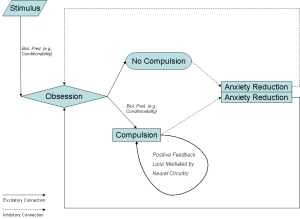Exposure & Response Prevention (ERP) for OCD: Treatment Mechanism
How does ERP work? What mechanism underlies it?
Obsessive-compulsive disorder (OCD) is characterized by obsessions and compulsions. Obsessions are disturbing thoughts, images, or impulses that increase feelings of anxiety. Compulsions (also known as “rituals”) are the strategies that individuals with OCD use to reduce the anxiety associated with obsessions. Rituals are effective coping strategies in the short-term, in that they lead to fairly rapid decreases in anxiety. However, rituals are considered maladaptive, because the anxiety relief they bring is short-lived. Engaging in rituals ultimately increases the likelihood that obsessions will be re-experienced in the future. This can be thought of as a positive feedback loop, in which compulsive behavior indirectly reinforces obsessions. This is depicted in the bottom half of the included figure.
The treatment of choice for OCD is exposure and response prevention (ERP), which not surprisingly, has two main components: 1) exposure, and 2) response prevention. Response prevention refers to purposefully inhibiting one’s rituals, whereas exposure refers to willingly entering situations that are likely to trigger obsessions. Both exposure and response prevention elements are necessary for making meaningful treatment gains.
Response prevention is the critical component in “short-circuiting” the positive feedback loop in OCD. When one implements regular response prevention, obsessions are no longer reinforced and ultimately decrease in frequency and intensity. This is represented in the upper half of the included figure. Purposeful exposure provides further opportunities to break this cycle. The more exposures you complete, the more the positive feedback loop degrades. Eventually, with enough practice, exposure therapy immunizes you to many of your triggers.
Some people get very stressed out at the prospect of completing exposures. They think, “How could I possibly do an exposure? I’m anxious enough as it is!” This sentiment is most common prior to initiating treatment and quickly fades once the individual begins practicing regular exposure. If you feel this way, keep in mind that if you complete structured exposure according to a hierarchy of feared situations (e.g., using subjective units of distress [SUDs] ratings), the process is less likely to feel stressful and overwhelming.
Questions? Comments? Sound off below.
Want Updates about New Content?
Follow Me!
Follow @drstevenseay
18 Comments
Trackbacks/Pingbacks
- Sexual Orientation Came here for answers, the worrying is constant. OCD about sexuality? - Empty Closets - A safe online community for gay, lesbian, bisexual, transgender people coming out - [...] live with that doubt, so that you are less prone to questioning. The website also refers to "Exposure &…













Dr. Steve,
O seu blog me inspira a aprender inglês para que eu possa ler melhor e aprender com suas publicações. Aquilo que consegui ler, a forma de apresentação do seu blog, suas abordagens são incríveis. Está de parabéns. Conheço muitos psicólogos e psiquiatras aqui em BH e tomei a liberdade de lhes mandar o seu blog.
Muito obrigado! I’m so glad you enjoyed your visit, and I really appreciate that you shared my site with others. I’ll have to work on my Portuguese…maybe someday I’ll be able to write a short post in Portuguese.
Hello Doctor,
I have read all your post about sensorimotor ocd and i find both your articles and the readers questions helpful with my situation. I have obsession with swallowing since i was 17 and i am 25 now. The anxiety that i go through every time i swallow when i am around the people that i love is killing me really all these years. When i am around people that i dont care about the symptoms are less powerful but when i am around my family or my best friends the symptoms gain more power suddenly and i start to sweat and my mind stucks with same thought like what if i swallow now how they will think about me ?? I am not worth their love or their respect because my mind is not focused on them but on the process of me swallowing. After those thoughts comes the anxiety alongside with embarrasment from my own family. I feel like i have no more control of my life those 8 years. I wish i could go back in time and live life as i used to live it when i was 17 with no fears and no anxieties but this is not possible. The main thought that makes me feel anxious is that with the problem that i have i am letting down the people that i love.. like they expect more from me but i cant do any better.. it feels like they expect from me to do sth for myself not to feel anxious when i am around them because they love me and i know how much they hate my anxiety when around them but at the same time they dont understand how hard it is for me to work with this issue and start improving. I start to work with ERP last week when i first read some of your articles and i noticed improvement on the level of anxiety the first two days but then i had a panic attack the symptoms where there with much more intense and this caused me a very depressive and lonely day but now i am back and trying hard to keep going with the ERP strategy but i know that i must see a psychotherapist too something which is very difficult to do here in Albania. I read someones post about some medicines that he used and he had a big improvement on the level of anxiety and the symptoms themselves would you suggest me to use same medicines that had effect on someone ellse or should i move to another country for a visit with a psychotherapist and see what to do then?
Hi Alex,
Both psychotherapy and medicine can be helpful, so both might ultimately be part of your recovery plan. The SSRIs, the medications most likely to help with OCD, affect different people differently. Thus, there’s no guarantee that a medication that worked well for someone else will necessarily work best for you. Unfortunately, finding the right medication may involve a bit of trial and error. Trust your psychiatrist to guide medication selection. He or she will choose the medicine that s/he thinks will be most helpful for you.
Good luck!
Hi, im from Rio de Janeiro, Brazil. Sorry if my english is not that great. I recently have been locked in this cycle of constantly thinking about my breathing. Very much like you described above is like a constant awareness of my breath and a panic that i would never let go of that thought. I’m currently on prozac and recently started on agomelatine. What kind of exposure can i do to fight this problem? i cound’t think of any. Can this episode be drug related?
Hi Eduardo,
You might want to read the following article (if you haven’t already):
http://www.steveseay.com/treatment-body-focused-obsessions-ocd/
Good luck!
Sir,
I have read all your articles regarding sensorymotor OCD and its treatment. My husband has been suffering with this condition for more than 3yrs now. I came to know about it recently and I want him to get rid of it as i couldnt see him suffering. Your article has given me lot of hope and i believe he can be completely alright. We live in San Antonio and where can i find therapists specific for sensorymotor OCD? Can we consult any therapist who is specialised in CBT and ERP?
Thank you for your article.
Hi Sathya, I would recommend finding a therapist who treats OCD with ERP. Someone with experience in acceptance and commitment therapy (ACT) might be ideal.
Thank you Sir.
I have a huge problem with FEAR. I have been diagnosed with panic and anxiety disorder and OCD. I am on meds, which are helpful from me going into full panic attacks all day long. However over the past 3 weeks I have been completely obsessed about my tongue. I finally found something that I can’t run from because its connected to me. I have thoughts all day long “I cant get my tongue out, I cant get my tongue out” which is making me absolutely crazy and I focus on my tongue all day long. Any thing that causes me pain or I fear I was always able to get away from. Have you heard of this and is it sensorymotor OCD? If so, I am worried and scared because I dont know if I can handle this forever
I would recommend talking with your doctor who is prescribing the medications to make sure that you’re not experiencing a medication-related side effect. Some individuals have tongue-focused sensorimotor OCD symptoms, but it’s important to rule out medical causes before assuming it’s SMOCD.
Hello ( sorry for my english In from Qc Canada )
I have a question regarding the Response prevention in ERP . If Example my ocd is around fearing being gay , i heard Therapist said during exposure to react by saying to yourself ” Im gay im gay!!” and others therapists by ”I MAY be gay” and others therapist said to react by ”accept the tought without giving any signifiance you PROBABLY not gay” . I really found this confusing , i mean if I fear killing my son , Do I tell myself ”Im gonna kill my son” or ”I MAY kill my son”…My point here is Do i have to believe what im fearing 100% or believe the possibily i MIGHT . Because I heard different answer from the therapists !!
Thanks for the help I really need it!
This is a very good question. Different therapists do approach these situations differently. Part of the reason is that even within ERP, individuals are trained differently. In my own practice, I used to more frequently recommend, “It’s possible that..” because it seemed more accurate as to what was actually happening in that moment. For some individuals, though, acknowledging this as a possibility sets off a flurry of mental rituals (which are obviously unhelpful). That is why in the context of completing an actual exposure, I will more often encourage the use of the unwanted statement directly. In the end, neither approach is right or wrong. It just depends on what works for you. Above all, the most important part is the step immediately beyond making the statement…i.e., not ritualizing.
Hi Steven, I’ve been dealing with SMOCD for over 4 years now with no relief . My form of OCD revolves around my Tongue and the way I talk. I feel most therapist don’t understand this form of OCD and I often worry whether or not my therapist is treating me accurately. I’ve been on and off of therapy within the last 4 years to no avail. I’m kind of at my wits end. Any advice would be great, and have you worked with many patients with this form of SMOCD? Is their a light at the end of the tunnel?
As I was reading this I was thinking, “I don’t know if I could do this,” but I suppose I could with a therapist. I just hope I wouldn’t resist it. Like yesterday, I was trying to tell myself, “It’s okay to think that thought, and you don’t have to be worried and pray obsessively,” but it was really hard because I kept thinking, “but what if..” I told my Mom I think I might have OCD, she told me I don’t because my phsyciatrist said I don’t and I don’t wash my hands alot. I don’t want to seem silly, but I really am starting to notice some symptoms of Pure-O.
Hi Dr. Steve, I have a question about ERP. I have been doing some self directed exposure therapy for sexual orientation obsessions and I can tell that it usually raises my anxiety. But sometimes my exposures “fall flat” (I don’t know how else to describe it?) and I don’t feel anything but just a sinking feeling in my stomach and kind of disgusted because the exposure doesn’t bother me that much and it feels like it’s just confirming my feeling that I’m secretly gay. Is this still anxiety, even though it isn’t the “hot” kind I’m used to? I’ve beaten this once before, but fell into the overconfident/certainty trap and now I’m back here again. And it feels bad, just kind of blah and like perhaps I should just start dating girls instead of guys because that’s the message I am “feeling” (I put feeling in quotes because I know this is a common symptom of ocd but who knows… maybe it’s a true feeling?)
Anyway, any feedback you have would be great. I have a therapist who has helped me work through some of this but erp isn’t her specialty so we’re making a team effort. I’ve struggled with OCD in various forms my entire life but this is the first time I’m actually doing something about it. I use the Mindfulness for OCD book as well and it’s been helping but I feel like there is a lack of information about how ERP makes you feel- right now I feel like something I don’t want is coming true and just feel sick.
I think I have had OCD since my earliest years, but that was the touch the right side then the left side type. In the last few years, I have been obsessed with words, punctuation, and symbols. The words have to add up to 10 and the punct. or symbols have to be even. This has evolved into a very complicated OCD form, for example when I am watching television or when I am reading.
My psychiatrist has prescribed 20 MG of Lexapro, but it doesn’t make a dent. And I have tried consciously trying to dismiss the OCD, but it keeps creeping back in. It seems that this compulsion rules my life. Or ruins it!
Can you give me any advice?
Hello, I have recently found out that I have HOCD. All the symptoms that describe it fit the problems I have and I decided to help my self as therapy is not an option for me currently. I started ERP and my anxiety started to go away from one exposure I did for about 1 HR. But I still had the thought but this time with no anxiety. Does this mean I enjoy these thoughts now?
Thank you